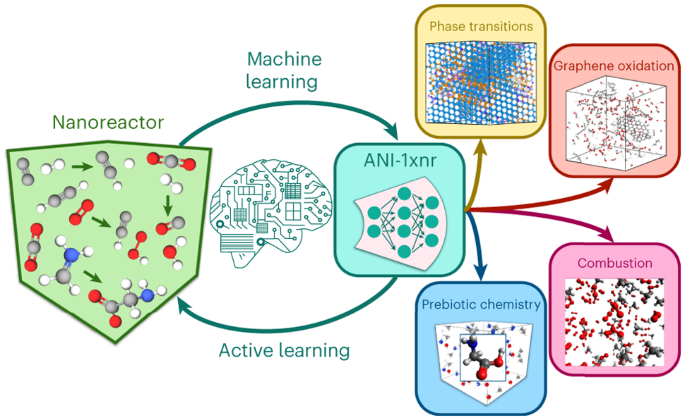2024-03-21 ロスアラモス国立研究所(LANL)
<関連情報>
- https://discover.lanl.gov/news/0320-ai-chemistry-frontiers/
- https://www.nature.com/articles/s41557-023-01427-3
一般的な反応性機械学習の可能性で凝縮相化学のフロンティアを探る Exploring the frontiers of condensed-phase chemistry with a general reactive machine learning potential
Shuhao Zhang,Małgorzata Z. Makoś,Ryan B. Jadrich,Elfi Kraka,Kipton Barros,Benjamin T. Nebgen,Sergei Tretiak,Olexandr Isayev,Nicholas Lubbers,Richard A. Messerly & Justin S. Smith
Nature Chemistry Published:07 March 2024
DOI:https://doi.org/10.1038/s41557-023-01427-3
Abstract
Atomistic simulation has a broad range of applications from drug design to materials discovery. Machine learning interatomic potentials (MLIPs) have become an efficient alternative to computationally expensive ab initio simulations. For this reason, chemistry and materials science would greatly benefit from a general reactive MLIP, that is, an MLIP that is applicable to a broad range of reactive chemistry without the need for refitting. Here we develop a general reactive MLIP (ANI-1xnr) through automated sampling of condensed-phase reactions. ANI-1xnr is then applied to study five distinct systems: carbon solid-phase nucleation, graphene ring formation from acetylene, biofuel additives, combustion of methane and the spontaneous formation of glycine from early earth small molecules. In all studies, ANI-1xnr closely matches experiment (when available) and/or previous studies using traditional model chemistry methods. As such, ANI-1xnr proves to be a highly general reactive MLIP for C, H, N and O elements in the condensed phase, enabling high-throughput in silico reactive chemistry experimentation.




